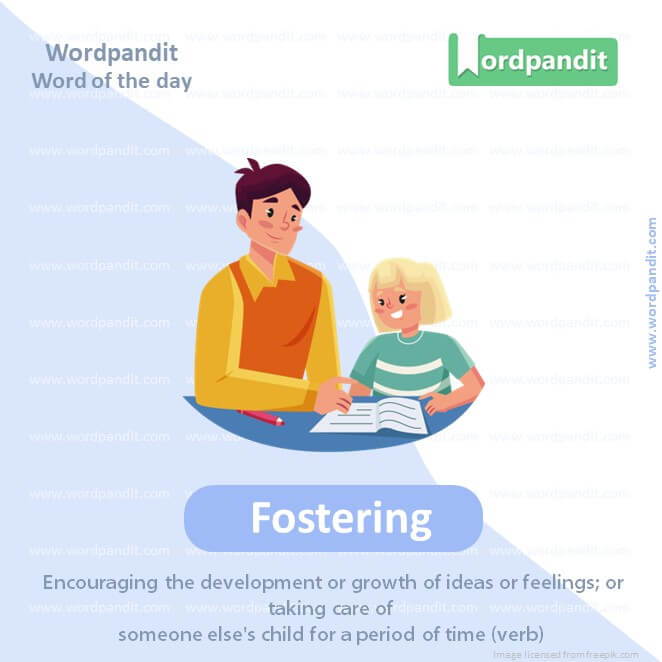Daily Vocabulary Words: Enhance Your Lexicon with Leading Newspapers & Publications
Welcome to the Daily Vocabulary section at Wordpandit!
Our mission is straightforward: to bring you essential vocabulary words featured in top newspapers and publications worldwide. By focusing on words you’ll encounter in renowned sources, we aim to help you enhance your vocabulary effectively and practically.
Our selection includes words from:
– The New York Times
– The Washington Post
– Scientific American
– BBC
– The Guardian
– Psychology Today
– Wall Street Journal
– The Economist
– The Hindu
– The Times of India
– The Economic Times
– Hindustan Times
– Live Mint
– The Indian Express
– And many more.
We are committed to your vocabulary development. Simply visit this section regularly and explore the daily posts. This is your go-to repository for commonly used words, providing significant practical benefits by familiarizing you with vocabulary from the leading publications listed above.
Make it a habit to visit our website daily and expand your lexicon with words from top newspapers and publications.
WORD-1: ADOLESCENCE
CONTEXT: My father took me to Sector 19, off Madhya Marg, as our first Prime Minister was visiting Chandigarh, a city still in its adolescence, if not infancy. I was hardly three years old. As the pilot car passed by, the crowd got excited and started chanting and shouting slogans. My father lifted me on his shoulders so that I could have a clear view. I could see him in a slow-moving open car standing and waving to the crowds. The handle bar in his car was full of marigold garlands which he was throwing gradually one after another towards the crowd gathered along the Marg.
SOURCE: The Hindu
EXPLANATORY PARAGRAPH: Adolescence is like a phase where you’re growing up and changing from a child to an adult. Think of it as the middle stage in the life of a city or a person when they’re still developing and not yet fully grown or mature. It’s a time of growth and transformation.
MEANING: The period of life when a person is developing from a child into an adult (noun).
PRONUNCIATION: ad-uh-LES-uhns
SYNONYMS: Puberty, youth, teenage years, maturation, growing-up phase
USAGE EXAMPLES:
1. The city’s adolescence was marked by rapid growth and development.
2. Her adolescence was filled with changes and new experiences.
3. The novel explores the challenges of adolescence.
4. During adolescence, many people experience emotional ups and downs.
WORD-2: EXPOSITION
CONTEXT: When he died, I was in the fourth standard. His Will’s copy printed on both sides of paper in Hindi and English was distributed to every child in the class. Later on, our school master, Moola Ram, delivered a sort of lecture on that Will. The way he described in his exposition Pandit Nehru’s love and attachment to the Ganga and his love for his countrymen brought me close to tears twice.
SOURCE: The Hindu
EXPLANATORY PARAGRAPH: Exposition is like explaining or describing something in detail so everyone understands it. Imagine telling a story and going into all the details to make it clear and interesting—that’s what exposition does.
MEANING: A detailed explanation or description of something (noun).
PRONUNCIATION: ek-spoh-ZISH-uhn
SYNONYMS: Explanation, description, exposition, clarification, analysis, presentation
USAGE EXAMPLES:
1. The teacher gave a detailed exposition of the scientific method.
2. The book’s exposition helped readers understand the complex themes.
3. Her exposition of the new policy was clear and thorough.
4. The exposition on ancient history was informative and engaging.

WORD-3: VORACIOUS
CONTEXT: Since then, I have tried to read every article or write-up on him that I could lay my hands on. He was a voracious reader at least till Independence and was himself an author of some eminently readable books. Discovery of India was one of the most well-known. Shyam Benegal turned this book into a sensitively beautiful serial by the name Bharat ek Khoj for Doordarshan.
SOURCE: The Hindu
EXPLANATORY PARAGRAPH: Voracious means having a huge appetite or eagerness, especially for reading or consuming something. Imagine someone who loves to eat so much that they can’t get enough—that’s a voracious reader when it comes to books.
MEANING: Having a very eager approach to an activity, especially eating or reading (adjective)
PRONUNCIATION: vuh-RAY-shus
SYNONYMS: Ravenous, insatiable, avid, eager, hungry, enthusiastic
USAGE EXAMPLES:
1. She is a voracious reader who devours books in a matter of days.
2. His voracious appetite for knowledge led him to study multiple subjects.
3. The voracious demand for new technology is driving innovation.
4. He had a voracious interest in collecting rare stamps.
WORD-4: DELVE
CONTEXT: In the vast and diverse landscape of India, social media is no longer just a means of connecting with friends; it has emerged as a powerful force shaping various aspects of society, including the economy. From small businesses to large corporations, the influence of social media is palpable. In this article, we’ll delve into how social media is playing a pivotal role in contributing to India’s Gross Domestic Product (GDP) and ushering in a new era of economic engagement.
SOURCE: The Times of India
EXPLANATORY PARAGRAPH: Delve means to dig deeply into something, like investigating or researching a topic thoroughly. Think of it as digging into the ground to uncover something hidden—similarly, when you delve into a subject, you’re exploring it in detail.
MEANING: To investigate or research something deeply (verb).
PRONUNCIATION: DELV
SYNONYMS: Explore, investigate, probe, examine, research, dig into
USAGE EXAMPLES:
1. The article delves into the impact of social media on the economy.
2. She decided to delve deeper into the topic for her research paper.
3. The detective delved into the case to find new evidence.
4. He delved into his family history to learn more about his ancestors.

WORD-5: THRIVE
CONTEXT: As social media continues to thrive, it creates new avenues for employment. From content creators and social media managers to digital marketers and data analysts, the digital economy powered by social media is generating jobs across various skill sets. This job creation contributes to economic growth and empowers individuals to participate in the evolving job market.
SOURCE: The Times of India
EXPLANATORY PARAGRAPH: Thrive means to grow or develop well, or to succeed and flourish. Imagine a plant that gets plenty of sunlight and water—it thrives and becomes strong. Similarly, when something thrives, it’s doing very well and growing positively.
MEANING: To grow or develop well, to be successful or prosperous (Verb)
PRONUNCIATION: THRIVE
SYNONYMS: Flourish, prosper, succeed, grow, advance, develop
USAGE EXAMPLES:
1. The business continues to thrive despite the economic downturn.
2. The community thrived with new development and opportunities.
3. Her garden thrived with the extra care she gave it.
4. The startup thrived in its first year, exceeding all expectations.

WORD-6: INCUBATORS
CONTEXT: Social media platforms serve as incubators for entrepreneurship. Individuals with innovative ideas can use these platforms to showcase their products or services, seek funding through crowdfunding campaigns, and build a community around their ventures. This democratization of entrepreneurship contributes to economic diversification and innovation.
SOURCE: The Times of India
EXPLANATORY PARAGRAPH: Incubators are like environments where new ideas or businesses are nurtured and developed until they’re ready to stand on their own. Think of it like a place where baby birds are cared for until they’re ready to fly.
MEANING: Devices that maintain optimal conditions for the growth or development, often used for eggs or premature babies (Noun)
PRONUNCIATION: IN-kyuh-bay-ters
SYNONYMS: Accelerators, nurturers, support systems, facilitators, launchpads
USAGE EXAMPLES:
1. The tech incubators helped numerous startups succeed.
2. She joined an incubator program to get support for her new business.
3. The university’s incubator provided resources for young entrepreneurs.
4. Incubators play a crucial role in helping innovative ideas come to life.
WORD-7: MISERABLE
CONTEXT: Densely populated crowds everywhere, with large buildings, very little greenery, and lives are being lived in most dangerous places. Survival and existence are a true challenge. The population spread is too lopsided and far from being even. We have made our lives miserable.
SOURCE: The Hindu
EXPLANATORY PARAGRAPH: Miserable is how you feel when you’re very, very sad or uncomfortable. Imagine it’s raining, and you’re cold, wet, and tired—that feeling is miserable. It’s when things are just really bad and you feel unhappy.
MEANING: Very unhappy or uncomfortable (adjective).
PRONUNCIATION: MIZ-er-uh-bul
SYNONYMS: Unhappy, sad, wretched, gloomy, depressed, despondent
USAGE EXAMPLES:
1. The cold weather made him feel absolutely miserable.
2. She was miserable after her best friend moved away.
3. The dog looked miserable after being out in the rain.
4. His miserable expression showed that he wasn’t enjoying the party.
WORD-8: TRANSCENDED
CONTEXT: Social media has transcended its role as a mere communication tool and has become a catalyst for economic growth in India. From empowering small businesses to fostering entrepreneurship, enhancing global visibility to creating jobs in the digital economy, the impact of social media on India’s GDP is multifaceted.
SOURCE: The Times of India
EXPLANATORY PARAGRAPH: Transcended means to go beyond or rise above something. Imagine climbing a mountain and reaching a point where you can see beyond the peak—that’s transcending. It means surpassing or exceeding usual limits.
MEANING: To go beyond or rise above something (verb).
PRONUNCIATION: tran-SEND-id
SYNONYMS: Surpassed, exceeded, overcame, outstripped, transcended, elevated
USAGE EXAMPLES:
1. Her achievements transcended the expectations of her peers.
2. The art form transcended traditional boundaries to create something new.
3. The film’s success transcended local markets and gained international acclaim.
4. His performance transcended the usual standards of excellence.

WORD-9: FOSTERING
CONTEXT: Social media has transcended its role as a mere communication tool and has become a catalyst for economic growth in India. From empowering small businesses to fostering entrepreneurship, enhancing global visibility to creating jobs in the digital economy, the impact of social media on India’s GDP is multifaceted.
SOURCE: The Times of India
EXPLANATORY PARAGRAPH: Fostering means encouraging or helping something to grow and develop. Imagine taking care of a young plant to help it grow into a big tree—that’s fostering. It involves nurturing and supporting growth.
MEANING: Encouraging the development or growth of ideas or feelings; or taking care of someone else’s child for a period of time (verb)
PRONUNCIATION: FOS-ter-ing
SYNONYMS: Nurturing, supporting, encouraging, promoting, cultivating, aiding
USAGE EXAMPLES:
1. The organization is fostering new talents in the field of science.
2. They are fostering a collaborative environment to encourage innovation.
3. The school’s programs are designed to foster creativity and critical thinking.
4. By fostering strong community ties, the initiative has helped many local businesses.

WORD-10: AGNOSTIC
CONTEXT: Nehru was a self-proclaimed agnostic who was secular to the bone and above communal prejudice. He led the newly independent nation in the right direction for almost 17 years, notwithstanding a few glaring mistakes.
SOURCE: The Hindu
EXPLANATORY PARAGRAPH: Agnostic means someone who believes that it’s impossible to know whether or not there is a god or higher power. It’s like being unsure and not committed to a specific belief about the existence of a deity.
MEANING: A person who does not have a definite belief about whether God exists or not
PRONUNCIATION: ag-NOS-tik
SYNONYMS: Skeptic, doubter, non-believer, uncertain, questioner
USAGE EXAMPLES:
1. As an agnostic, she felt that the existence of a god was beyond human understanding.
2. His agnostic views were evident in his discussions about religion.
3. The debate between atheists and agnostics often revolves around the certainty of belief.
4. Being agnostic, he preferred to keep an open mind about various religious concepts.
Vocabulary Hard Words
The experience of unraveling the depths of language learning often leads us to ‘vocabulary hard words’. These challenging jargons might seem daunting initially, but with the right learning strategies, the enigma of ‘vocabulary hard words’ can turn into an enticing quest. But how can these ‘vocabulary hard words’ be learned effectively?
Firstly, to master ‘vocabulary hard words’, it’s vital to break down the process into manageable steps. Instead of tackling several words at once, focus on understanding a few each day. This gradual approach ensures effective retention and understanding.
Multimedia resources tremendously aid in comprehending ‘vocabulary hard words’. Movies, podcasts, or even music in the target language contribute a comprehensive perspective. They provide real-life contexts and usages of ‘vocabulary hard words’, making them more understandable and less intimidating.
The incorporation of memory-enhancing techniques, such as flashcards or digital apps, can significantly bolster the retention of ‘vocabulary hard words’. Such tools encourage active recall, helping to cement these words into your long-term memory. Mnemonic devices can also aid in making these words more approachable by associating the hard words with relatable images or stories.
Practice is decisive when learning ‘vocabulary hard words’. Using these words in your conversations, written communications, or even social media posts will facilitate a robust understanding and recall.
Finally, do not worry about making mistakes while using ‘vocabulary hard words’. Mistakes are essential stepping stones in the learning process. They provide insights into areas that need more focus and help refine your grasp over these words.
In conclusion, grasping ‘vocabulary hard words’ is undoubtedly a challenging task but not an insurmountable one. With the aid of effective strategies including graded learning, multimedia resources, memory-enhancing tools, and regular practice, the process of mastering ‘vocabulary hard words’ can become an engaging and rewarding journey.











